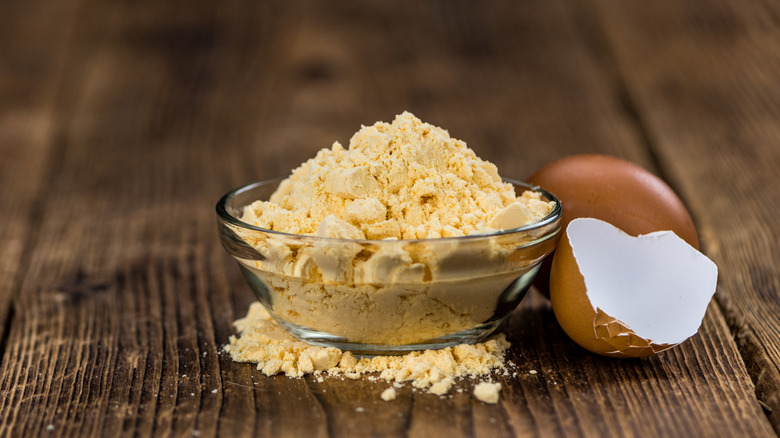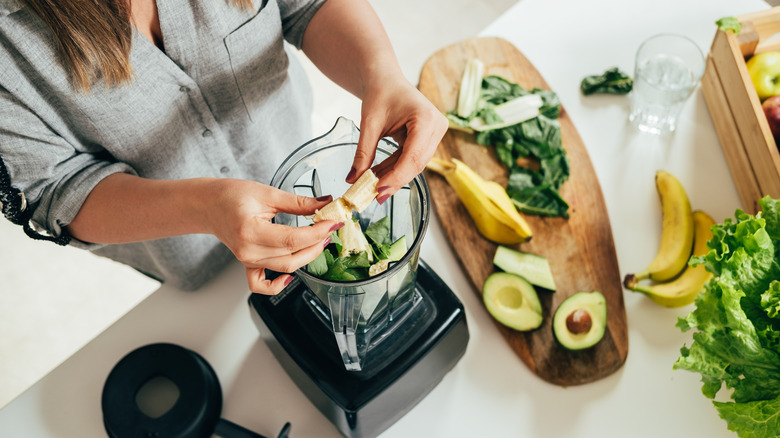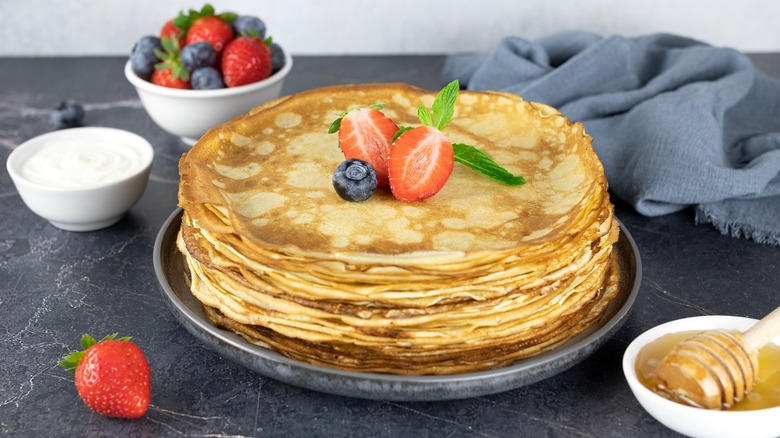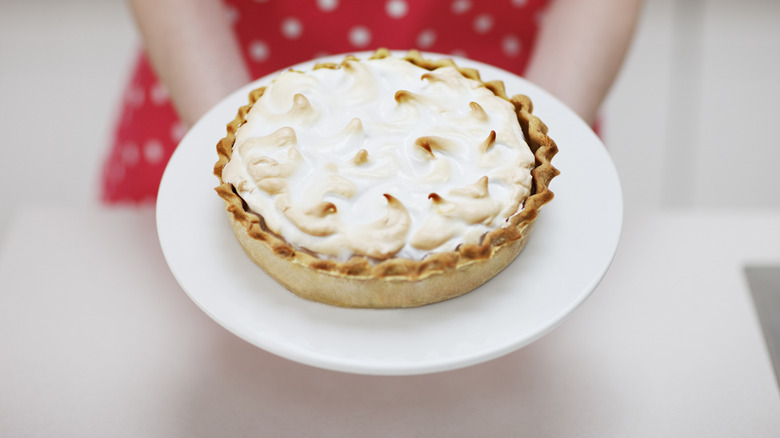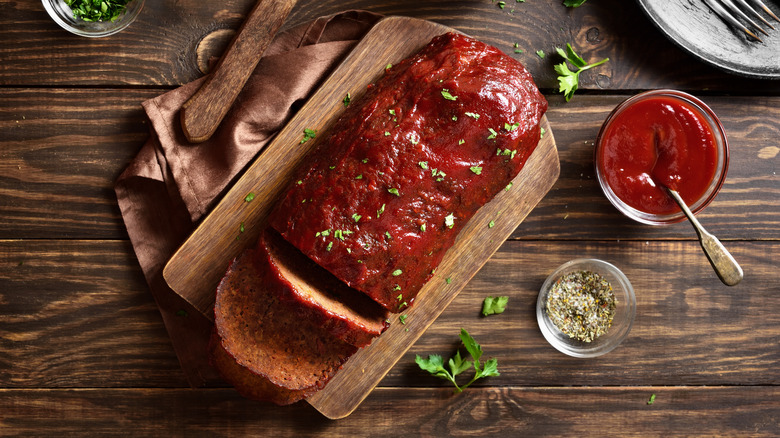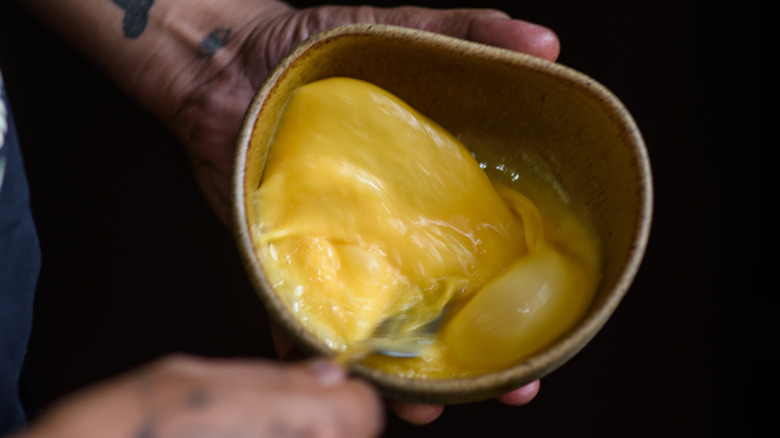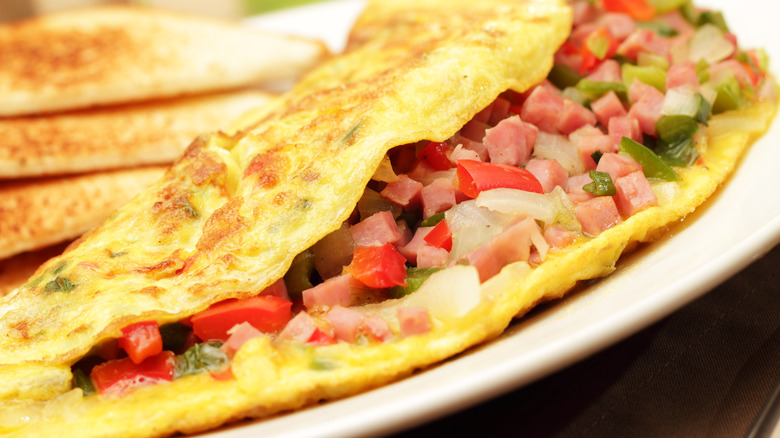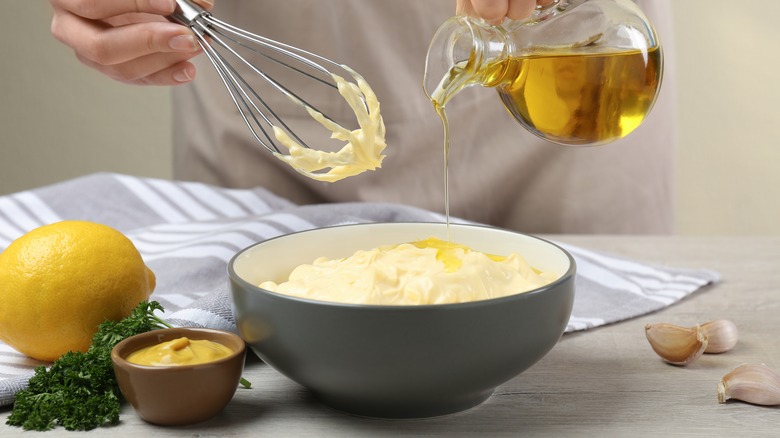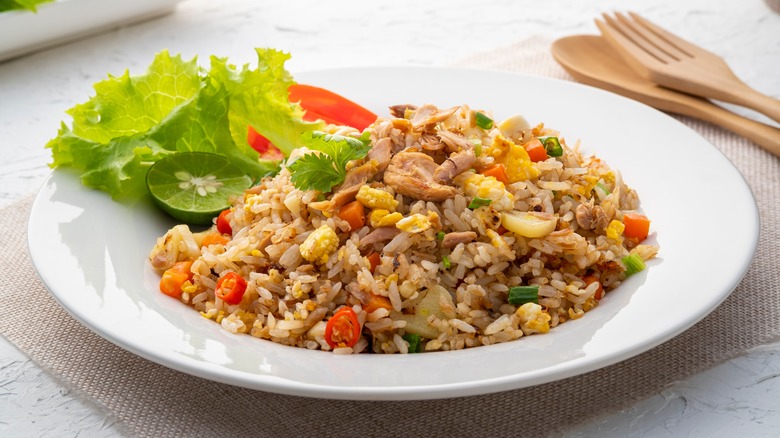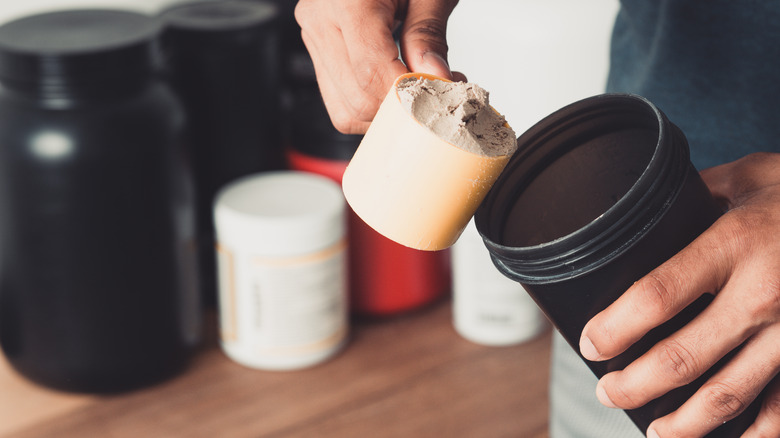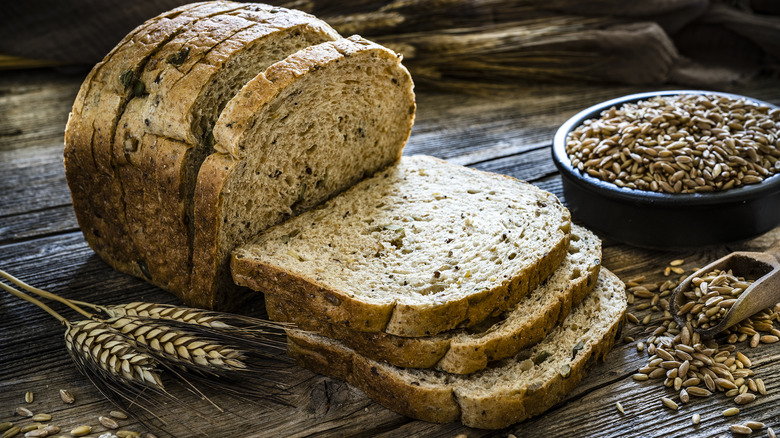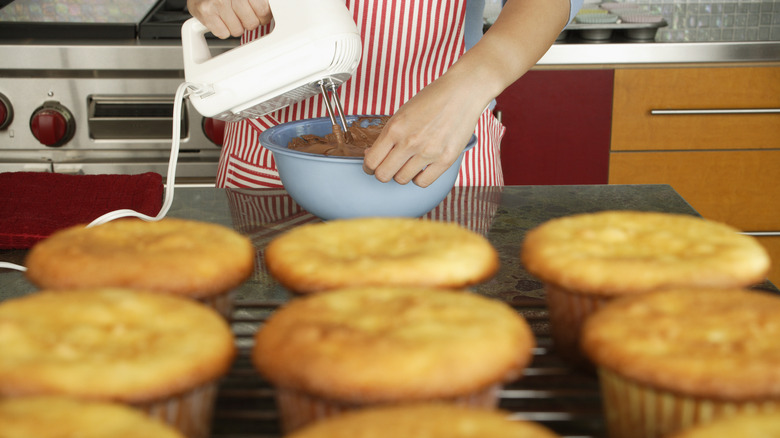All The Ways You Should Be Using Powdered Eggs
Using powdered eggs in a recipe may seem like a serious faux pas to seasoned home cooks, but it's a great way to make certain recipes faster with less hassle than the original, all while importing exciting taste and texture to your meals.
Powdered eggs come in a variety of forms, including powdered egg white, powdered whole egg, and even powdered egg white protein. We'll get into the details about each later, but for now, know that each of these plays a specific role in certain recipes, and may or may not need to be reconstituted with water to make them perform like traditional eggs.
We'll detail exactly how you can use powdered eggs to take the headache out of cooking and baking with fresh shelled eggs. Used for thickening, adding nutrients, and making a wide range of dried mixes, you can expect to put powdered eggs to great use in more ways than you might have ever imagined. If that sounds good to you, then pull up a seat. We're getting ready to unveil intriguing details concerning this powerful yet often-overlooked kitchen staple.
Smoothies
If you've never heard of adding an egg to your smoothie, then the mere suggestion may sound weird and off-putting. It's true that placing eggs in your smoothie isn't super common, and in fact, it may even pose a few health risks when done incorrectly.
Still, when it comes to using powdered eggs in smoothies, you can expect less of a mess on your hands with the added bonus of a thick, creamy, and delicious smoothie. It can also give your smoothie a wonderful shot of natural protein, which will keep you feeling full, giving your body the energy needed to build muscle.
So, are there any risks with using powdered eggs? Since smoothies aren't traditionally cooked, it's important to consider whether adding eggs is actually safe for you and your family. According to the USDA, powdered whole eggs or powdered egg whites can be safely eaten without cooking since they're pasteurized, but it still may be best to cook them if you're serving them to the elderly, the pregnant, or other high-risk groups. For this reason, we only recommend adding powdered eggs to smoothies for healthy individuals to reap their benefits.
Pancakes
Want to make your own pancake mix? If so, then it might be a good idea to consider grabbing a bag of powdered eggs the next time you visit the market. Powdered eggs make it so that you don't have to deal with cracking egg shells, and even risking those shells getting into your pancake batter. Simply mix the powdered eggs and powdered milk in with all your normal dry ingredients like sugar, flour, baking powder, and salt. When you're ready to cook it up, just add a bit of water and stir until it assumes a batter-like consistency. Use butter or oil for frying the way you normally would, and voila, you've got yourself a fluffy and delicious pancake perfect for lazy weekday mornings.
Worried your pancakes will taste a little plain? Try adding a handful of dry ingredients to spice things up. Cinnamon will do the trick, as will dried blueberries, sprinkles, or any other creative additions you can think of. You could even add chocolate chips to your dry powdered egg pancake mix, though we'd only recommend you do this if you can keep it in a dry, cool place. Otherwise, you'll risk the chocolate chips melting before you can get them in the pan. Oops!
Meringue
A wonderfully whipped French meringue can sometimes be the "icing on the cake" when it comes to topping fancy desserts. Try it paired with a lemon pie or chocolate silk pie, or use it to top a banana pudding, and prepare for the ultimate satisfaction you won't be able to get enough of. Making a meringue usually involves fresh raw egg whites to create a light and pillowy topping texture. But did you know the same can be achieved using powdered egg white? Doing so makes for an overall neat and easy process that can have your cakes topped beautifully and efficiently.
To make a meringue out of powdered eggs, you'll follow nearly the same process you would with fresh egg whites. Simply whip the mixture using a hand mixer until stiff peaks form. Then, smoothly apply your freshly whipped blend over your pie, cookies, or any other dessert of your choosing, before popping it in the oven for a few minutes until browned. This is a wonderful way of making delicious meringue with less mess and stress in your kitchen but with similar baking results. Just be sure to add a little water and increase the temperature of your oven slightly to ensure you achieve the results you want.
Meat loaf
Mmm, meatloaf. Its rich, beefy, and undeniably savory flavor is the perfect weekend dinner that emulates all the comfort and nostalgia we often associate with home and family. Thankfully, powdered eggs can be used here, too, and like in other recipes we've mentioned, it'll make things a bit easier in the kitchen while still perfectly holding together your meat along with all your delicious add-ins.
Most people add wet eggs to their meatloaf to help it hold its shape. With this in mind, you'll want to add a smidge of water to reconstitute a powdered egg, along with maybe a splash or two of Worcestershire sauce to liven things up. Break apart your fresh beef with your hands into a bowl before adding your seasonings, cooked onions, breadcrumbs, and whatever else suits your fancy. Then, pour your egg mixture along with the liquid over the top. Be careful not to make your egg mixture too wet by adding too much water, as this may cause your meatloaf to fall apart or become oddly textured. Instead, 2 tablespoons of water per 1 tablespoon of powdered egg will usually do the trick. Enjoy!
Survival needs
Ever prepared for the apocalypse or just those surprise visits from the in-laws? If so, you've definitely pondered which superfoods in your pantry have the power to outlast all else! Thankfully, powdered eggs can easily be added to your emergency list for when the unexpected calls. Powdered eggs are known to last anywhere from 5-10 years when stored correctly and can be whipped up in an instant using only water to reconstitute.
Not only do powdered eggs last a long time, but they can free up space in your fridge and pantry, too. Since the eggs are powdered, there's no need to refrigerate them, which can give your fridge shelves a much-needed break from the stacks of cartons you normally store there. Additionally, powdered eggs usually come in a compact bag that occupies far less space compared to their larger bag or carton counterparts.
All in all, you can rely on powdered eggs to be a safe way to stash food for an emergency situation in which you may not be able to make it out to the store or farm for fresh eggs. Just know that the taste of these powdered eggs on their own won't be nearly as flavorful as fresh eggs, but it'll work when you're in a pinch.
Omelets
Though powdered eggs don't typically taste as flavorful as fresh eggs, you can still jazz them up by adding tasty additions that'll probably leave you unable to discern the difference. Transforming your eggs into a delectable omelet or frittata is an excellent way to add some pizzazz to your breakfast, as these recipes offer abundant opportunities for customization and personalization.
To do this, reconstitute your powdered eggs with a bit of water as directed on the package, along with powdered milk if you have any on hand. Then, add seasonings like salt, pepper, garlic, and whatever else pleases your palette. Oil your pan if you wish with a tablespoon or two of olive oil, or swap that out for a pat of butter for added flavor.
Once you've poured the eggs into a pan and allowed them to set, load up the middle of your omelet with diced onion, peppers, cheese, meat, mushrooms, or spinach, and before you know it, you'll have a creation you can feel good about. Gently fold your omelet over those delicious fillings and serve. It's so easy, and with all those yummy additions, you probably won't even remember that you're eating powdered eggs.
Royal icing
Royal icing is a special kind of icing often applied to cookies and treats. It takes on a flat, glossy, and semi-hard texture that you'll often find on various goodie types, especially those traditionally associated with Christmas.
If you think royal icing is only for use in professional bake shops, then we've got news for you. You can actually make your own royal icing at home! The added bonus is that when using powdered eggs, pulling together a deliciously glossy royal icing recipe may be even easier than you think.
To make your own royal icing, first, make sure you're using powdered egg whites and not whole powdered eggs. There's a difference, and using whole powdered eggs here won't yield the consistency you're looking for. Once you've got your powdered egg whites in the bowl, add water and a bit of lemon juice or cream of tartar to the mix, and beat with a hand mixer until stiff peaks begin to form. Once this happens, pour in your powdered sugar along with a splash of vanilla. Beat or hand mix this mixture gently, and you'll end up with a thick, decadent, and deliciously sweet icing you'll be proud to smear over your freshly-baked cookies. Yes, please.
Mayonnaise
While it's convenient to find pre-made mayonnaise in jars at the store, if you're someone who appreciates the fresh taste of a homemade spread, you might just find delight in creating your very own saucy sandwich amplifier using powdered eggs.
To make powdered egg mayonnaise, you'll want to use equal parts egg and water, and add your own seasonings, including salt, pepper, your choice of mustard, and lemon juice. Afterward, add a light-flavored oil (such as safflower or avocado oil) slowly but liberally. The mixture will come together and become a delectably creamy condiment to top all your favorite sammies with.
If you don't feel like mixing it all by hand, try using a food processor or blender instead. Just add a few ingredients at a time to ensure that everything is well combined. That's it! It's fast, easy to make, and only requires a few simple ingredients without any cracked eggshells in sight.
Fried rice
Making fried rice? Try using powdered eggs to thicken it up a bit. While most people will readily scramble a fresh egg to mix into their fried rice, many fail to realize you can do virtually the same thing using powdered eggs. With this method, you can enjoy the delectable taste of traditionally delicious fried rice even without fresh eggs readily available. What's more, you can easily whip it up even in off-grid situations, like when you're hiking or exploring unfamiliar roads far away from a conventional kitchen.
To make this recipe come alive, you'll want to cook up your eggs first according to package directions. How much of the powdered eggs you use will depend on how big of a portion you want to scramble. Usually, 1 or 2 tablespoons of powdered eggs along with a couple of tablespoons of water should be enough, but actual portion sizes are ultimately up to you.
Gently scramble your eggs in your skillet before adding veggies, seasoning, and soy sauce to the mix. Add instant rice along with enough water according to the package and cook everything together. Once cooled, the results should be hot, tasty, filling fried rice you can take (and make) practically anywhere.
Protein powder
If you're looking for a healthy no-nonsense way to get in your protein, you may wish to give egg white protein powder a try. Unlike traditional protein powders, this unique additive features only one ingredient that's made up of exactly what you'd expect: egg whites.
Egg whites have been used and touted for their healthy high protein content for years. Incorporating powdered egg whites into your culinary endeavors also offers a myriad of benefits, including the fact that they contain no fat or cholesterol, although it's important to note that powdered whole eggs will contain both.
So, how can you use egg white protein powder? It's easy enough. Use it the way you normally would in a protein shake, blending it with fresh fruit, milk, spices, extracts, and whatever else suits your fancy. Some people also use egg white protein powder just as they would regular powdered egg whites as the ingredients are often virtually the same.
Bread
There's something so extremely satisfying about making homemade bread. From the smell that wafts from your kitchen to each delicate bite, bread-making is a treat for your senses in more ways than one. Still, making bread often comes down to a science, and those who have attempted the process know how finicky it can become.
Thankfully, powdered eggs come in handy when making bread, but the recipe you choose will be the determining factor in how well your bread turns out. When using powdered eggs to make bread, we recommend using a recipe that specifically calls for powdered eggs. Yes, this means more digging and searching, but ultimately, it will help you to ensure your liquid-to-dry ingredient ratio is spot on.
Some recipes recommend not adding any extra water since the dough may become exceedingly sticky and alter the consistency of the final baked product. Other recipes, on the other hand, may combine the liquid needed to reconstitute the egg already as part of the recipe. In either event, powdered eggs are extremely effective at producing light, fluffy, and airy bread dough; you just have to select the right recipe to yield the desired results.
Cookies
Making cookies with powdered eggs is certainly possible, and trust us, it yields indescribably yummy results. However, because of the dry nature of powdered eggs and the need to add water to the mix, you may find that you need to switch up your strategy a bit when using powdered eggs instead of real eggs in cookie dough.
When starting your cookie dough mixture, you're likely accustomed to creaming the butter and sugars first. While this is indeed the best way to start show-stopping cookie dough, it isn't the best way to start when making them with powdered eggs. Instead, you'll want to combine your powdered eggs with the sugar and water (usually 1 tablespoon of egg powder to 2 tablespoons of water) first before adding butter to the mixture.
Why is this important? Because adding butter along with the water for the eggs first will cause the two ingredients to repel one another. The results will be inconsistent and unevenly mixed cookie dough, and no one wants that. Other than this slight deviation from the recipe norm, you can expect to use much of the same ingredients in a powdered egg cookie recipe as you would a normal one.
Homemade muffin mix
You probably know the benefits of picking up a good muffin mix from the store. Apart from being delicious, a muffin mix takes all the blood, sweat, and tears out of baking up fluffy and sweet muffins from scratch. The problem? A quick scan of ingredients often highlights the plethora of undesirable ingredients hidden in the mix, many of which are often easily avoided when making muffins at home.
Thankfully, you can come up with your own tasty muffin mix that'll rival and even taste better than the prepackaged ones. Simply add your powdered eggs, along with your flour, salt, powdered milk, and other dry ingredients to an airtight container. Don't forget to also add dried fruits like blueberries to further enhance the flavor. Once it's time to cook, just add a little oil and water, and boom, you've got homemade muffin batter ready to go. Pour the mixture into muffin tins and bake at 400 degrees Fahrenheit for 19-25 minutes (cook times and temperature will vary depending on the recipe). Yep, it's really that easy. Enjoy!
